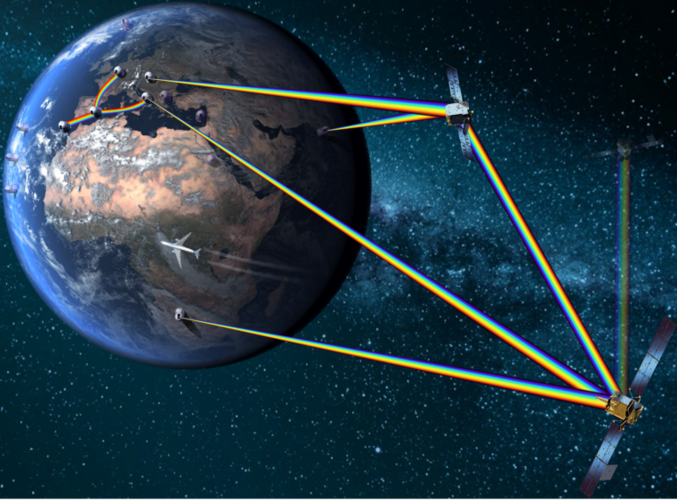New research explores CubeSat swarms for spacecraft servicing and repair
Sunday, 16 February 2025 05:25 As space agencies and private companies design satellites and telescopes with repairability in mind, the need for efficient servicing trajectories becomes crucial. Researchers from the Department of Aerospace Engineering at The Grainger College of Engineering, University of Illinois Urbana-Champaign, have developed a new method enabling multiple CubeSats to coordinate in servicing and assembling
As space agencies and private companies design satellites and telescopes with repairability in mind, the need for efficient servicing trajectories becomes crucial. Researchers from the Department of Aerospace Engineering at The Grainger College of Engineering, University of Illinois Urbana-Champaign, have developed a new method enabling multiple CubeSats to coordinate in servicing and assembling ESA Business Incubation Centres celebrate two decades of innovation
Friday, 14 February 2025 13:28
On 13 and 14 February 2025, the European Space Agency (ESA) celebrated 20 years of supporting space innovation through its ESA Business Incubation Centres (BIC) network. The event in Munich, Germany, brought together entrepreneurs, successful space companies, experts and policymakers.
Week in images: 10-14 February 2025
Friday, 14 February 2025 13:10
Week in images: 10-14 February 2025
Discover our week through the lens
Fly! Project media briefing
Friday, 14 February 2025 09:00 Video:
00:42:11
Video:
00:42:11
Watch the latest updates on ESA’s Fly! Feasibility Study with Daniel Neuenschwander, ESA Director of Human and Robotic Exploration, John McFall, Member of the ESA Astronaut Reserve & Fly! Subject Matter Expert, Jerome Reineix, Fly! Study Manager, and Alessandro Alcibiade, Fly! Flight Surgeon.
Announced in November 2022 during the Ministerial Council held in Paris, France, this unique and groundbreaking study is aimed at understanding and challenging the limitations posed by physical disabilities to human spaceflight. Concluded in late 2024, the Fly! Feasibility Study successfully demonstrated it is technically feasible to fly someone with a physical disability, like John’s,
Earth from Space: Heart of Mount St Helens
Friday, 14 February 2025 08:00 Image:
For Valentine’s Day, the Copernicus Sentinel-2 mission picks out a heart in the landscape north of Mount St Helens in the US state of Washington.
Image:
For Valentine’s Day, the Copernicus Sentinel-2 mission picks out a heart in the landscape north of Mount St Helens in the US state of Washington. Pierogi in space
Friday, 14 February 2025 07:00
In a first for space cuisine, ESA project astronaut Sławosz Uznański-Wiśniewski will bring pierogi, the traditional Polish dumplings, to the International Space Station during the upcoming Axiom Mission 4.
Sentinel-1C demonstrates power to map land deformation
Thursday, 13 February 2025 13:00
Launched just two months ago and still in the process of being commissioned for service, the Copernicus Sentinel-1C satellite is, remarkably, already showing how its radar data can be used to map the shape of Earth’s land surface with extreme precision.
These first cross-satellite ‘interferometry’ results assure its ability to monitor subsidence, uplift, glacier flow, and disasters such as landslides and earthquakes.
ESA's HydRON project for space-based optical communications moves forward
Thursday, 13 February 2025 12:52
The European Space Agency (ESA) has jointly signed a contract with Thales Alenia Space to develop Element #2 of its High-throughput Digital and Optical Network (HydRON), an advanced laser-based satellite system that will transform the way we communicate in space. This phase will establish a satellite collector in low Earth orbit (LEO), capable of connecting different orbital layers using cutting-edge optical technology.
Webb unveils evolving dust system and energetic jets
Wednesday, 12 February 2025 10:51 This latest NASA/ESA/CSA James Webb Space Telescope Picture of the Month showcases HH 30 with extraordinary clarity. Set within the dark cloud LDN 1551 in the Taurus Molecular Cloud, this edge-on protoplanetary disc features both jets and a disc wind, emphasizing the turbulent environment in which stars and planets form.
Herbig-Haro objects, like HH 30, appear as luminous markers in star-f
This latest NASA/ESA/CSA James Webb Space Telescope Picture of the Month showcases HH 30 with extraordinary clarity. Set within the dark cloud LDN 1551 in the Taurus Molecular Cloud, this edge-on protoplanetary disc features both jets and a disc wind, emphasizing the turbulent environment in which stars and planets form.
Herbig-Haro objects, like HH 30, appear as luminous markers in star-f SFL Missions Inc. Secures CSA Contract for HAWC Satellite Concept Study
Wednesday, 12 February 2025 10:51 SFL Missions Inc. has been selected by the Canadian Space Agency (CSA) to conduct a conceptual design study for the High-Altitude Aerosols, Water Vapour, and Clouds (HAWC) satellite mission. This initiative represents Canada's contribution to NASA's Atmosphere Observing System (AOS), which is scheduled for launch in 2031.
"The HAWC mission will collect atmospheric data that will support ex
SFL Missions Inc. has been selected by the Canadian Space Agency (CSA) to conduct a conceptual design study for the High-Altitude Aerosols, Water Vapour, and Clouds (HAWC) satellite mission. This initiative represents Canada's contribution to NASA's Atmosphere Observing System (AOS), which is scheduled for launch in 2031.
"The HAWC mission will collect atmospheric data that will support ex Physicists measure a key aspect of superconductivity in "magic-angle" graphene
Wednesday, 12 February 2025 10:51 Superconducting materials are similar to the carpool lane in a congested interstate. Like commuters who ride together, electrons that pair up can bypass the regular traffic, moving through the material with zero friction.
But just as with carpools, how easily electron pairs can flow depends on a number of conditions, including the density of pairs that are moving through the material. This
Superconducting materials are similar to the carpool lane in a congested interstate. Like commuters who ride together, electrons that pair up can bypass the regular traffic, moving through the material with zero friction.
But just as with carpools, how easily electron pairs can flow depends on a number of conditions, including the density of pairs that are moving through the material. This CSA awards $72M contract to Spire Global Canada for WildFireSat Mission
Wednesday, 12 February 2025 10:51 Spire Global Canada, has secured a Can$72 million contract, including harmonized sales tax, from the Government of Canada. The company will design and develop a satellite constellation dedicated to monitoring active wildfires across Canada from space as part of the country's WildFireSat mission. Spire will collaborate with OroraTech, a leader in space-based thermal intelligence, to develop the p
Spire Global Canada, has secured a Can$72 million contract, including harmonized sales tax, from the Government of Canada. The company will design and develop a satellite constellation dedicated to monitoring active wildfires across Canada from space as part of the country's WildFireSat mission. Spire will collaborate with OroraTech, a leader in space-based thermal intelligence, to develop the p Satellogic and Telespazio Brasil to provide low-latency satellite imagery for the Brazilian Air Force
Wednesday, 12 February 2025 10:51 Satellogic and Telespazio Brasil have signed a multi-year contract with the Brazilian Air Force (Forca Aerea Brasileira, FAB) to provide low-latency satellite imagery for defense and security applications. The agreement, which includes an initial one-year term with an option for a one-year extension, highlights Satellogic's growing role in delivering real-time geospatial intelligence to military
Satellogic and Telespazio Brasil have signed a multi-year contract with the Brazilian Air Force (Forca Aerea Brasileira, FAB) to provide low-latency satellite imagery for defense and security applications. The agreement, which includes an initial one-year term with an option for a one-year extension, highlights Satellogic's growing role in delivering real-time geospatial intelligence to military Green light for AI-driven mapping of New Zealand's forests
Wednesday, 12 February 2025 10:51 Researchers from Flinders University and New Zealand have successfully integrated artificial intelligence and 3D laser scanning to map radiata pine plantations across much of New Zealand's North Island with remarkable accuracy.
This innovative method differentiates between large-scale plantations, small woodlots, and newly established stands as young as three years old. The technique demon
Researchers from Flinders University and New Zealand have successfully integrated artificial intelligence and 3D laser scanning to map radiata pine plantations across much of New Zealand's North Island with remarkable accuracy.
This innovative method differentiates between large-scale plantations, small woodlots, and newly established stands as young as three years old. The technique demon DGIST Unveils Motion Powered System for Both Electricity and Light
Wednesday, 12 February 2025 10:51 DGIST (President Kunwoo Lee) has revealed that a combined research effort by Prof. Kim Hoe Joon (Department of Robotics and Mechatronics), Dr. Jeong Soon Moon (Division of Energy and Environmental Technology), and Prof. Mishra (University of Southern Denmark) has yielded a self-powered sensor that simultaneously produces electricity and light through motion and pressure. This battery-free advanc
DGIST (President Kunwoo Lee) has revealed that a combined research effort by Prof. Kim Hoe Joon (Department of Robotics and Mechatronics), Dr. Jeong Soon Moon (Division of Energy and Environmental Technology), and Prof. Mishra (University of Southern Denmark) has yielded a self-powered sensor that simultaneously produces electricity and light through motion and pressure. This battery-free advanc 
